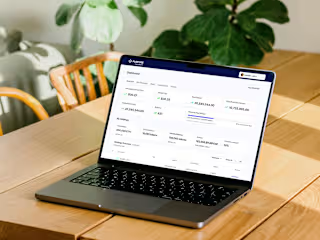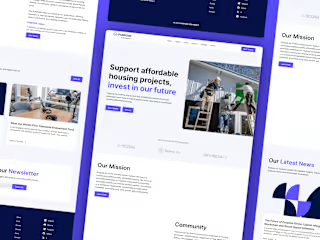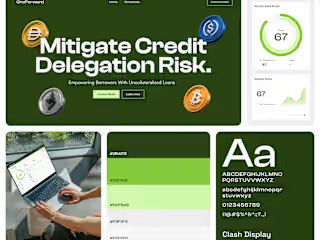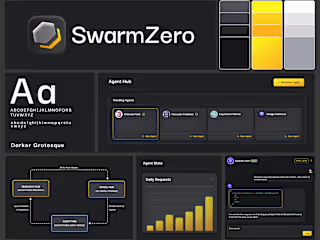Designing a Mobile Marketplace for Career Mentorship
Transforming how users navigate their careers with the on-demand support and expertise of career coaches, mentors, and recruiters.
Introduction
In a world where career success hinges on effective job interviews and professional growth, anxiety during interviews can be a significant roadblock to achieving one's goals. This case study explores how a mobile marketplace for career mentorship was conceptualized and designed to address this challenge, ultimately transforming how users navigate their careers with on-demand support from career coaches, mentors, and recruiters.
The Challenge
Job interviews are often a source of stress and anxiety for job seekers. The fear of rejection, uncertainty about the interview process, and pressure to perform well can negatively impact a candidate's ability to present themselves effectively. This anxiety can, in turn, hinder their career advancement and professional growth.
On the other side of the hiring process, recruiters face their own set of challenges. A shortage of talent is a persistent issue, with 65% of recruiters reporting it as their biggest hiring challenge. While many qualified applicants may exist, those who appear nervous or unprepared during interviews are often ruled out, leading to missed opportunities for both job seekers and employers. Furthermore, individuals who experience interview anxiety may avoid the job search process altogether, limiting their career prospect
The Solution
Designing a Mobile Marketplace for Career Mentorship
To address these challenges, a mobile marketplace for career mentorship was envisioned and designed. The platform aimed to connect job seekers, career changers, and professionals with experienced career coaches, mentors, and recruiters who could provide guidance, coaching, and support throughout their career journeys.
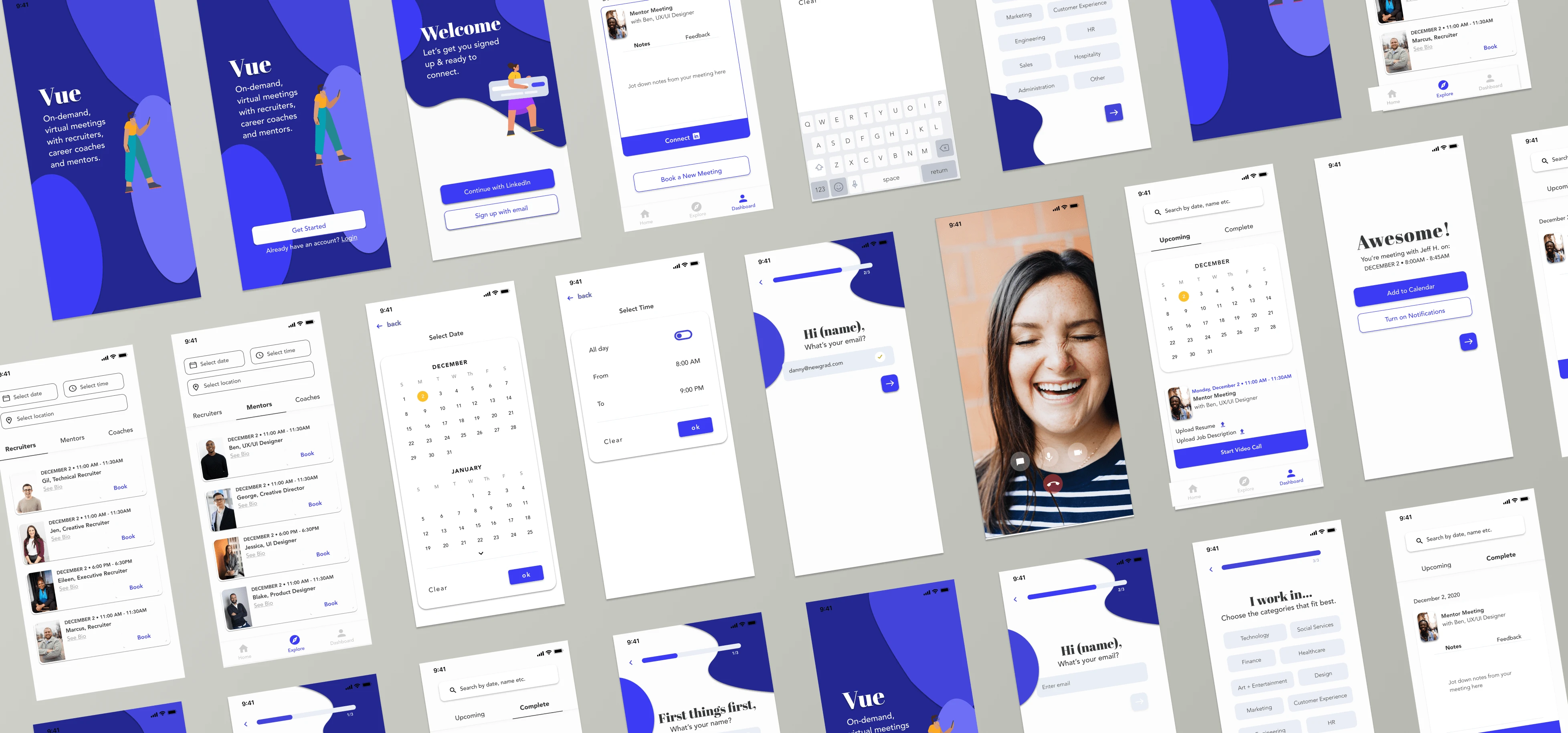
The Design Process
Discovery
Market Research and Analysis
As part of the discovery stage, I familiarized myself with the problem space through the review of 20+ online research reports and articles. The reporting on this topic supported my hypothesis, with the data highlighting that interview anxiety is pervasive, and has significant implications for both individuals and businesses.
A competitive review revealed that outside of traditional career coaching which comes at a price premium, all of the solutions available in the space were geared towards the Executive Suite or technical careers such as Software Engineering and Data Science.
User Research
Extensive user research was conducted to understand the pain points and needs of job seekers, career changers, and recruiters. In-depth interviews, surveys, and user testing helped identify common issues related to interview anxiety and career growth.
The most significant takeaway from the user interviews was that participants wanted support in navigating their careers from beyond the interview process and invested significantly in their careers. Using the insights and themes that emerged from the user interviews I created two personas to help guide and ground all design decisions.
Getting the interview, really being able to stand out, is a lot harder for me than the actual interview itself.”
User Personas: Meet Danny and Femke
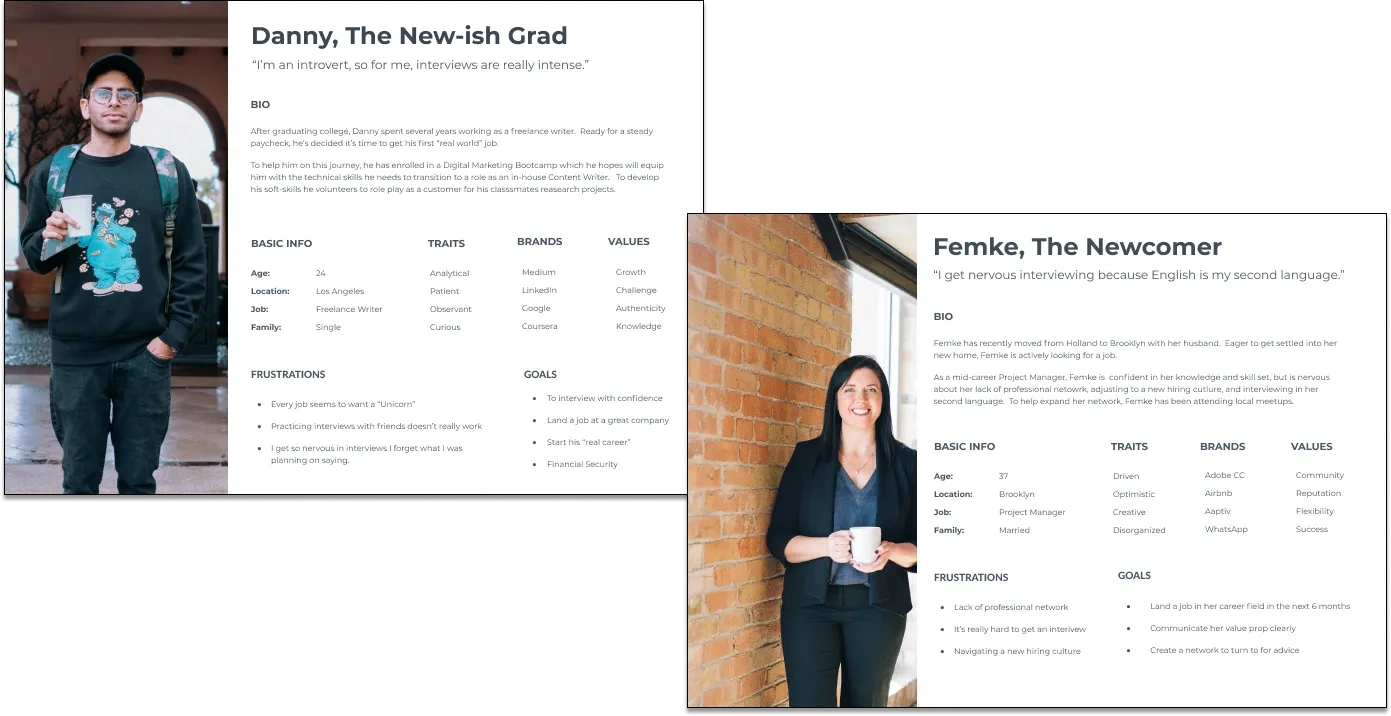
Primary and Secondary User Personas
UX Design
A user-centered design approach was employed to create an intuitive and user-friendly mobile app. Prototypes and wireframes were iteratively designed and tested with potential users to ensure a seamless user experience.
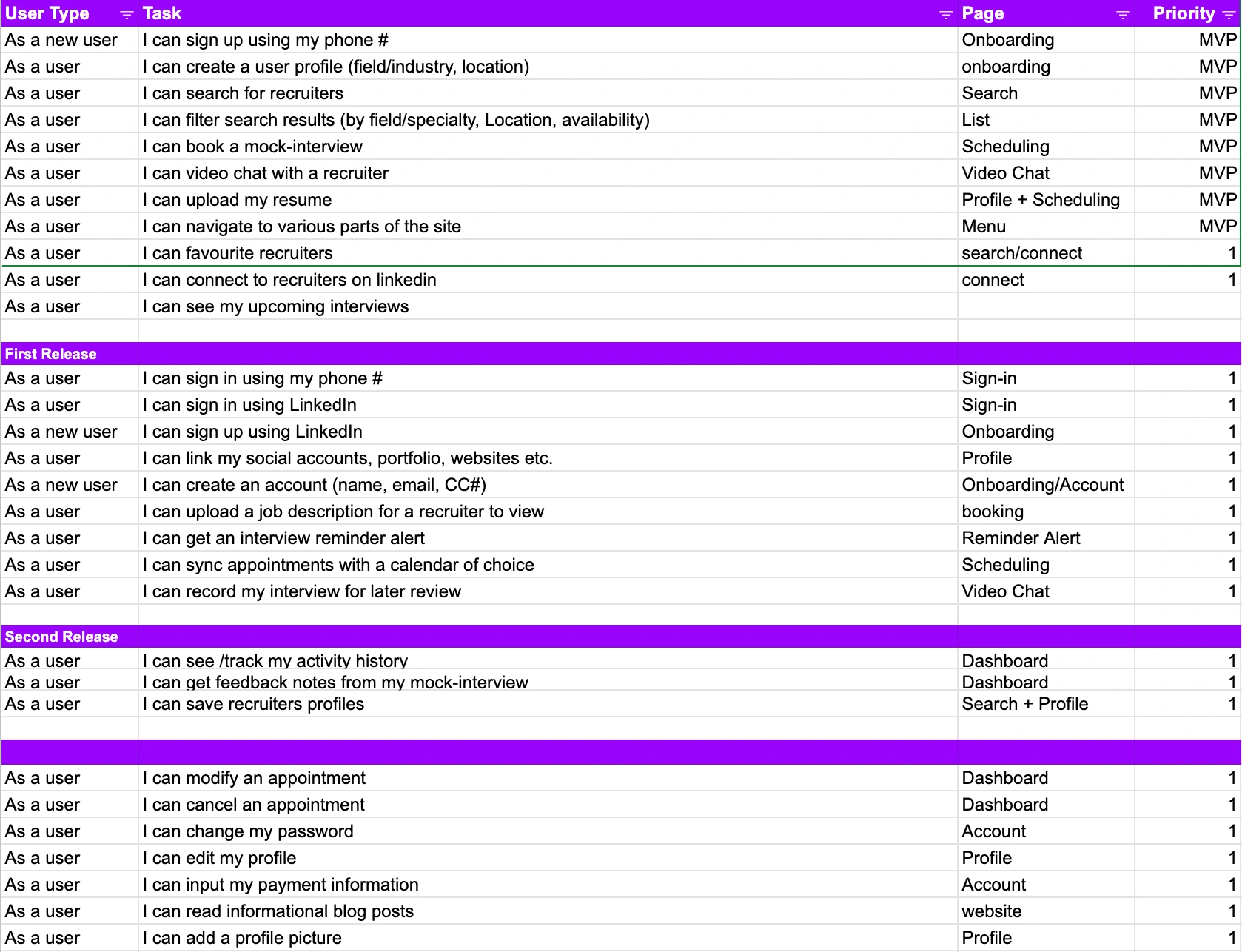
User Stories
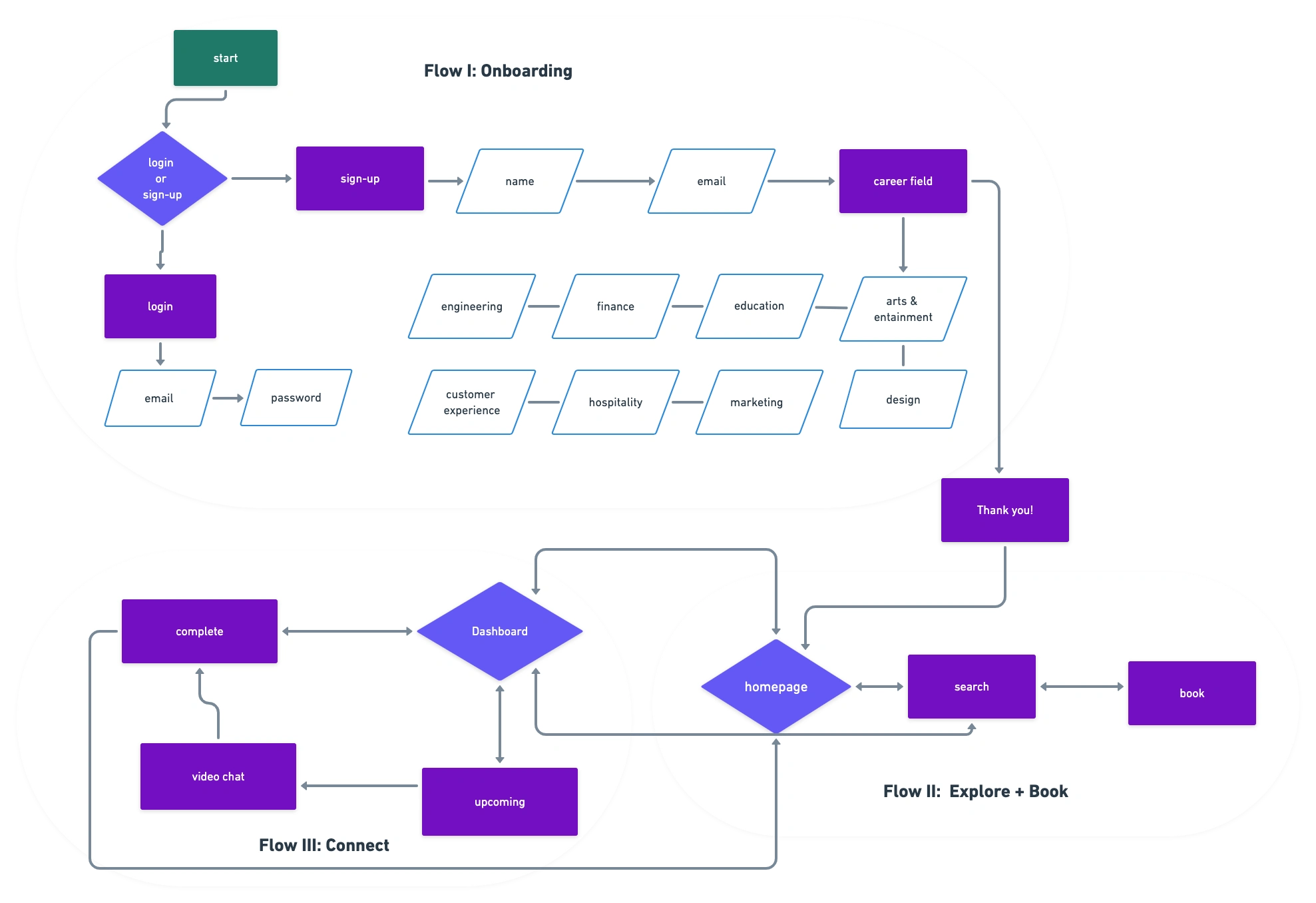
User Flow
Lo-fidelity Prototyping + User Testing
Sketches and workflows allowed me to visualize solutions and define the navigation structure of how users could easily find and connect to career support.
Based on the research I wanted to make the app feel easy and empowering to counter the complexity and anxiety users described as feeling when traditionally navigating their career. With this in mind, I focused on using design patterns that would reduce cognitive load, as well as, provide feedback, flexibility, and personalization.
User Testing
I conducted usability testing sessions with low-fidelity interactive prototypes to gather feedback and iterate on designs. Users found the app easy to navigate and struggled with CTAs not being clear enough.
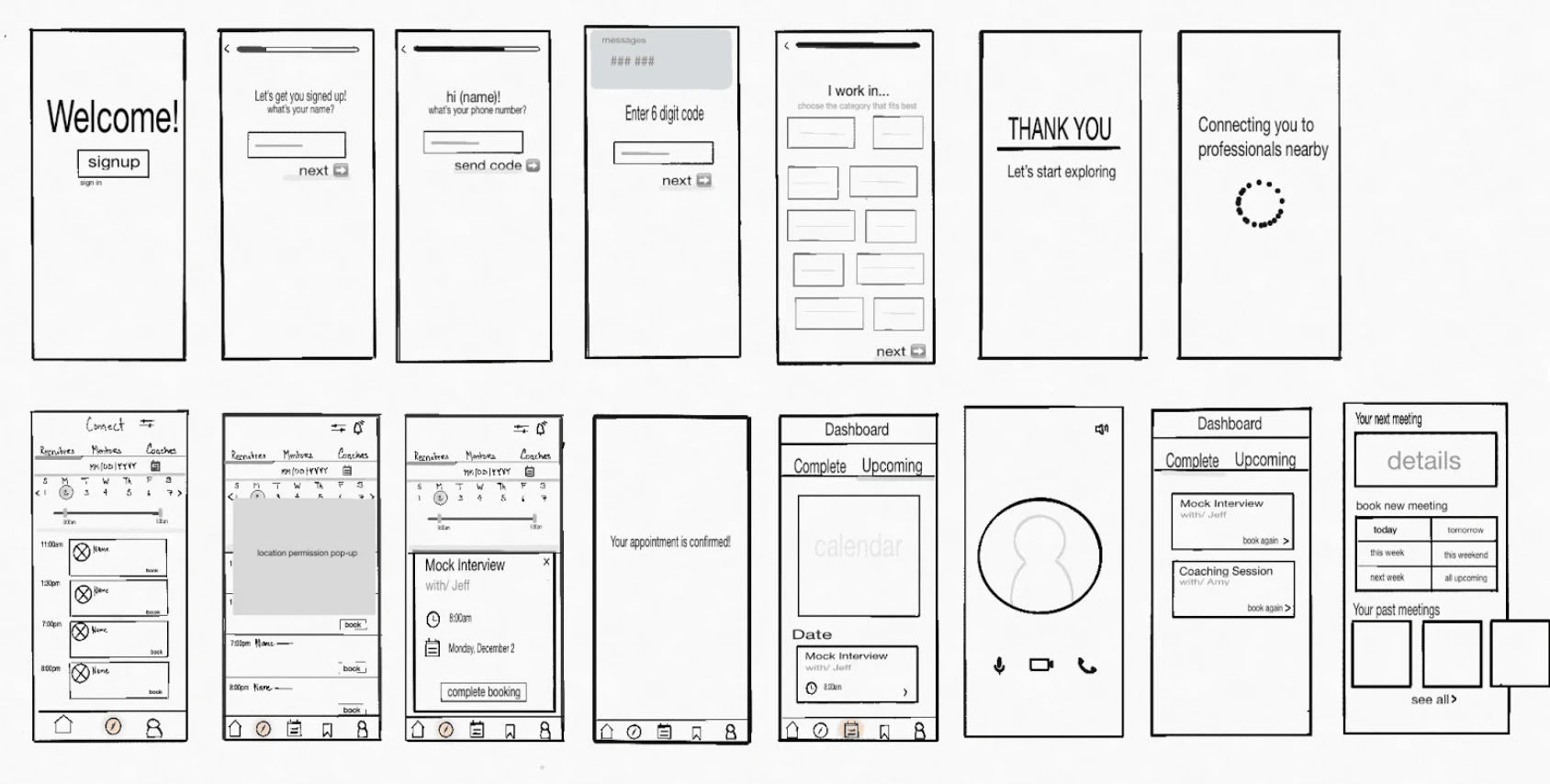
Initial iPad Sketches
Features and Functionality
The app included features that enabled individuals to match with mentors and coaches who aligned with their career goals, on-demand video consultations with mentors, interview practice sessions, and feedback. The design features a lightweight onboarding flow that delivers the user to the app’s core experience with minimal friction. The information that is requested provides meaningful and time-saving personalization.
Flexibility and convenience were key to the experience and delivered using in-app notifications, organizational aids such as add-to calendar and in-app notes, and engagement strategies to encourage low-effort ongoing interaction between users and mentors inside and outside of the app.
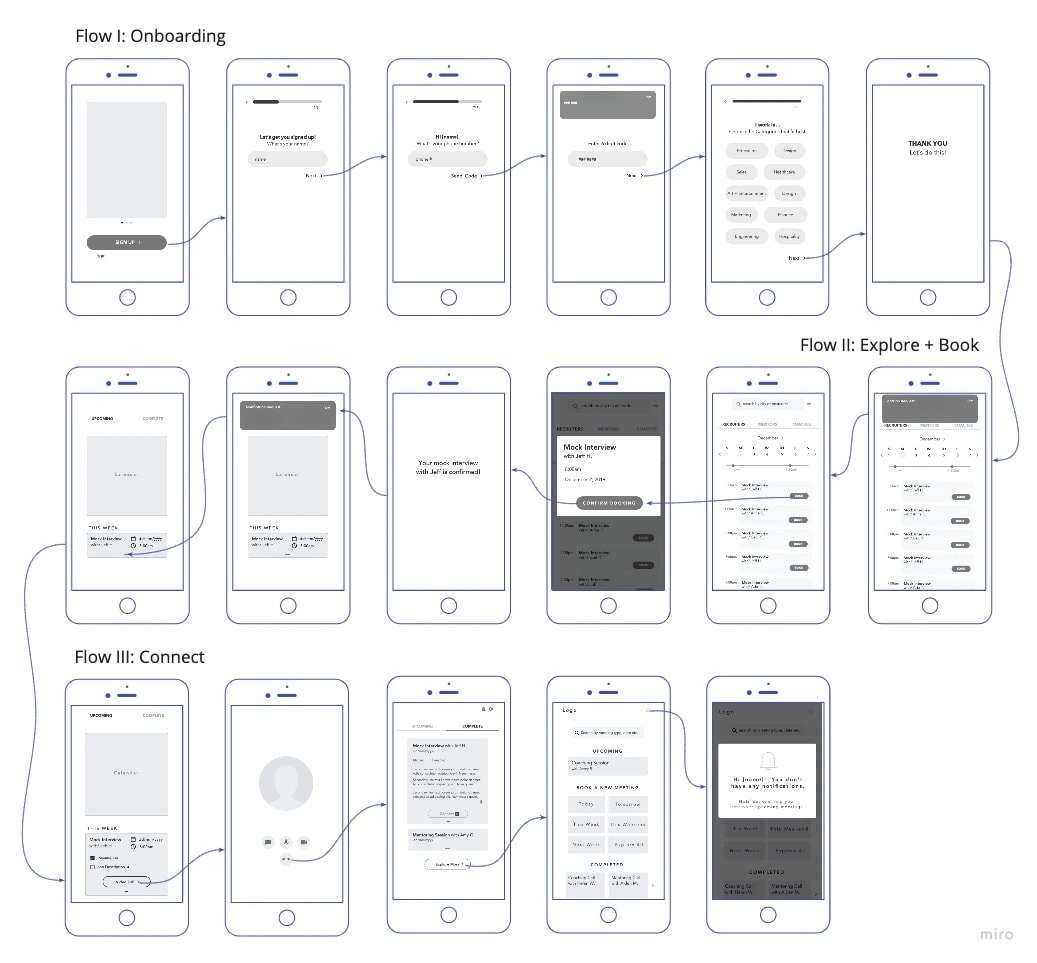
Lo-Fi Wireflow
Design Style Guide
To develop a consistent design language I created a style guide. I designed the color palette and interface to feel modern, friendly, and optimistic. The UX writing was crafted to support the mood, keeping things professional with a more casual and conversational tone that authentically mirrors how users actually communicate.
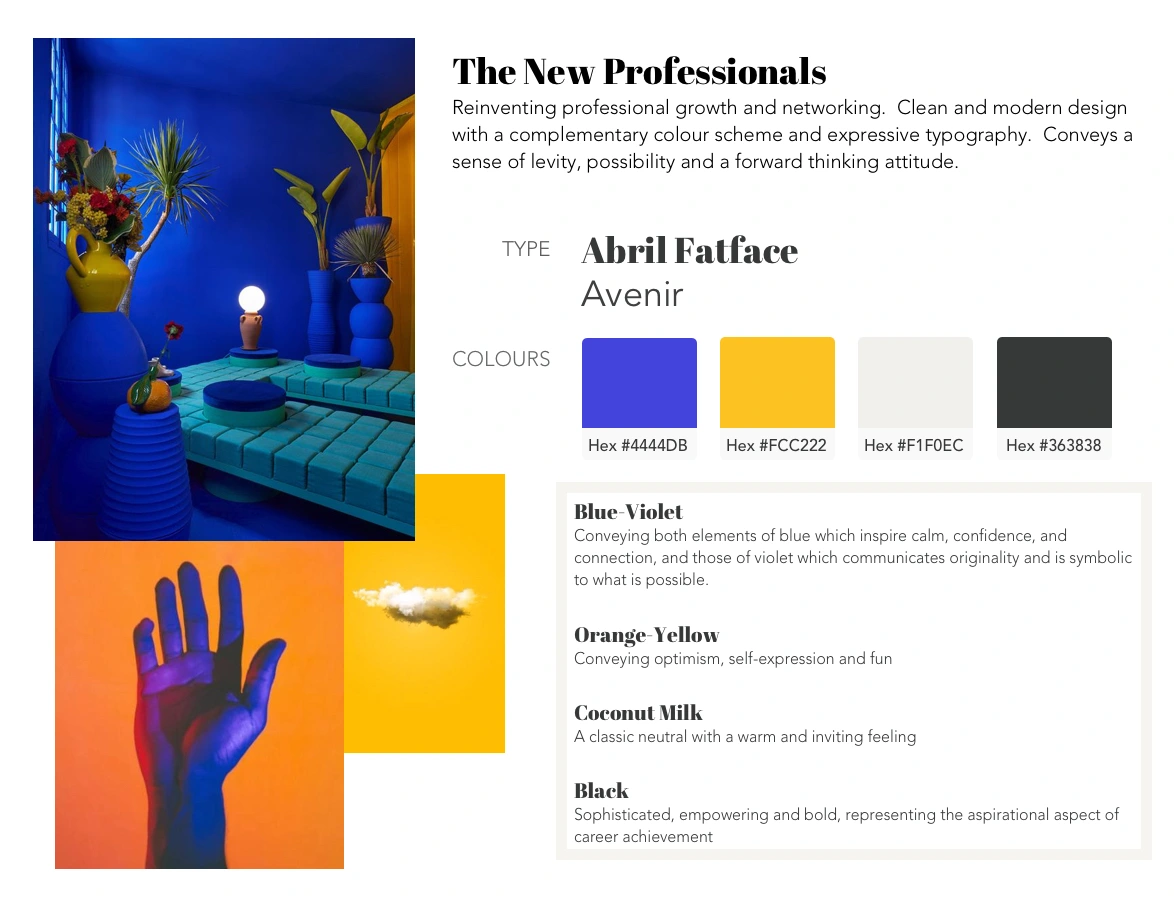
Style Guide
Hi-Fidelity Prototyping
The hi-fi prototypes created design mockups for key screens and used the style guide to ensure design consistency in the design elements. It took several iterations and feedback sessions to land on the final design which delivered on a modern yet approachable aesthetic.
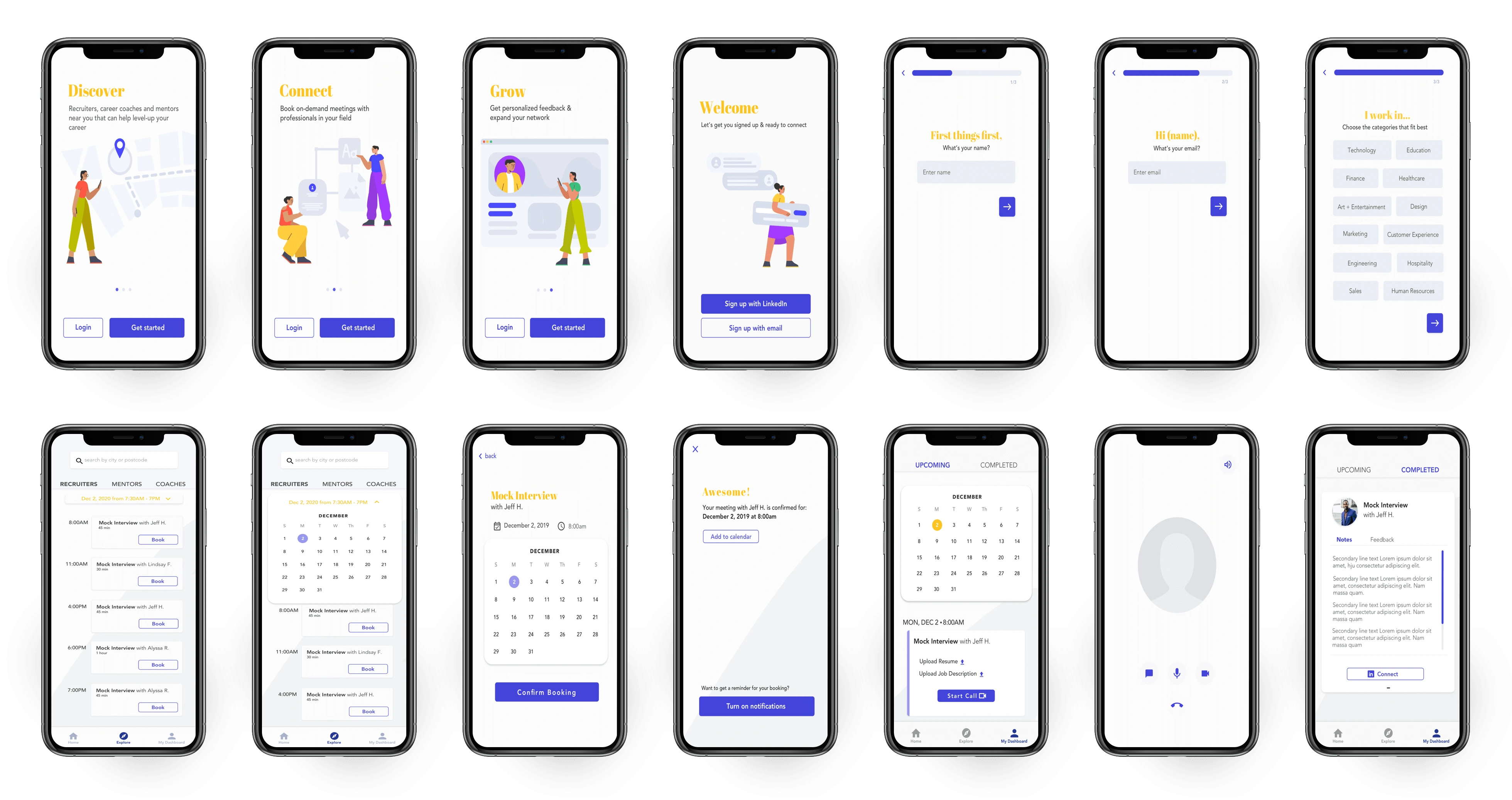
v1. Too Bland
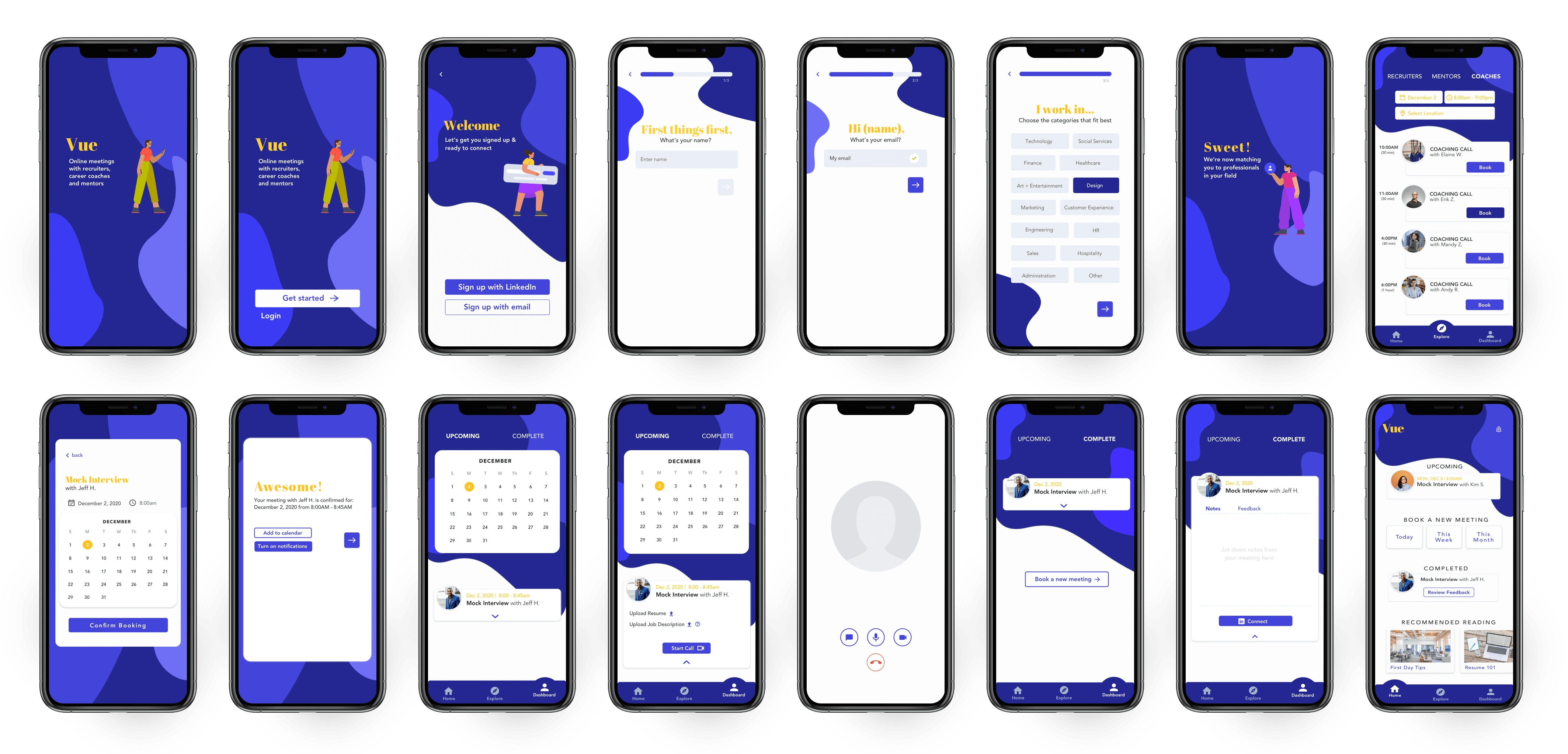
v2. Too Bold
Results
The mobile marketplace for career mentorship achieves significant outcomes:
Reduced Interview Anxiety: Users reported decreased interview anxiety and improved confidence in their job search process, leading to better interview performance.
Talent Pool Expansion: Recruiters had access to a larger and more diverse pool of candidates, reducing talent shortages.
Improved Career Outcomes: Job seekers and career changers found greater success in landing job offers and advancing in their careers, resulting in increased job satisfaction.
Positive Mentorship Community: A way to create a thriving community of mentors and mentees was established, fostering knowledge sharing and career growth.
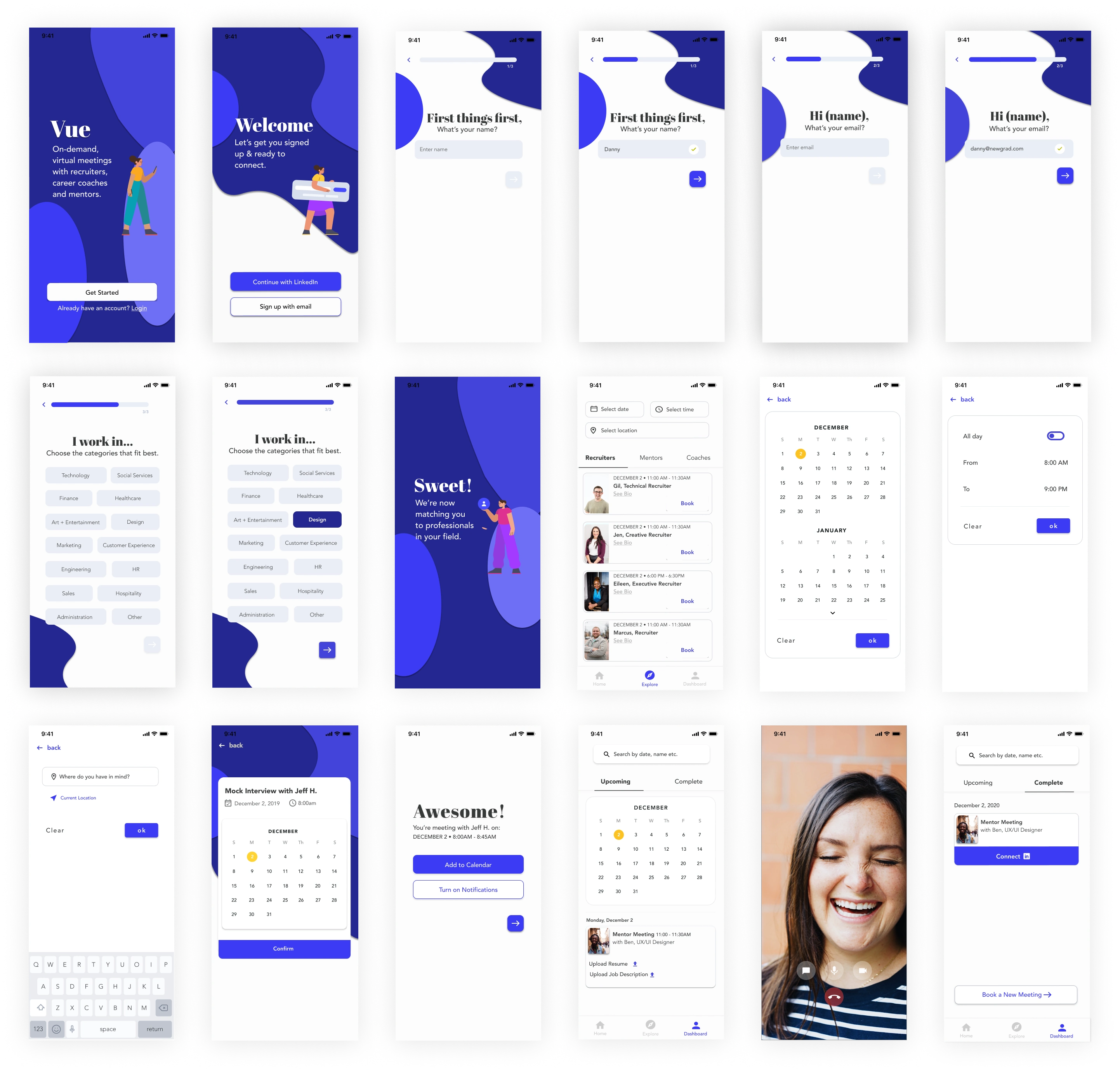
Just Right - The Final Design
Conclusion
By addressing the challenge of interview anxiety and the shortage of talent in the job market, the mobile marketplace for career mentorship not only transformed how users navigate their careers but also provided a valuable platform for mentorship and professional development. Early testing and feedback of this initiative underscores the importance of user-centered design and the potential for technology to bridge gaps in career advancement and talent acquisition.
Like this project
Posted Sep 23, 2023
Transforming how users navigate their careers with the on-demand support and expertise of career coaches, mentors, and recruiters.
Likes
0
Views
4





